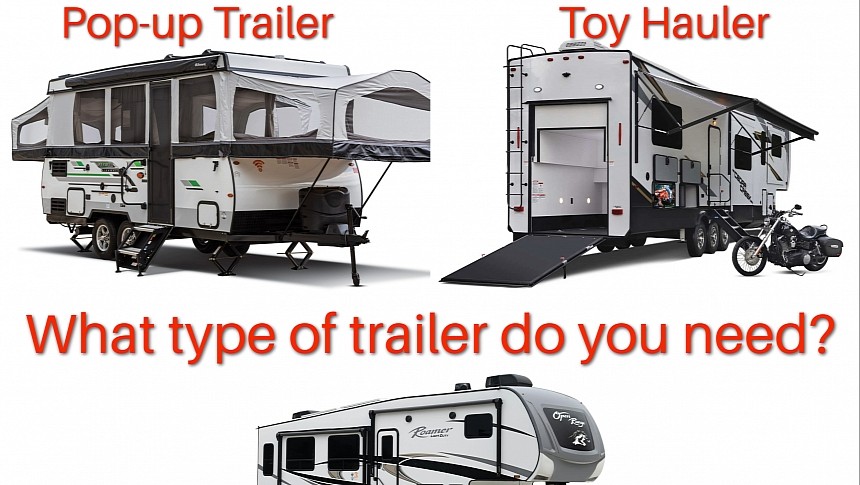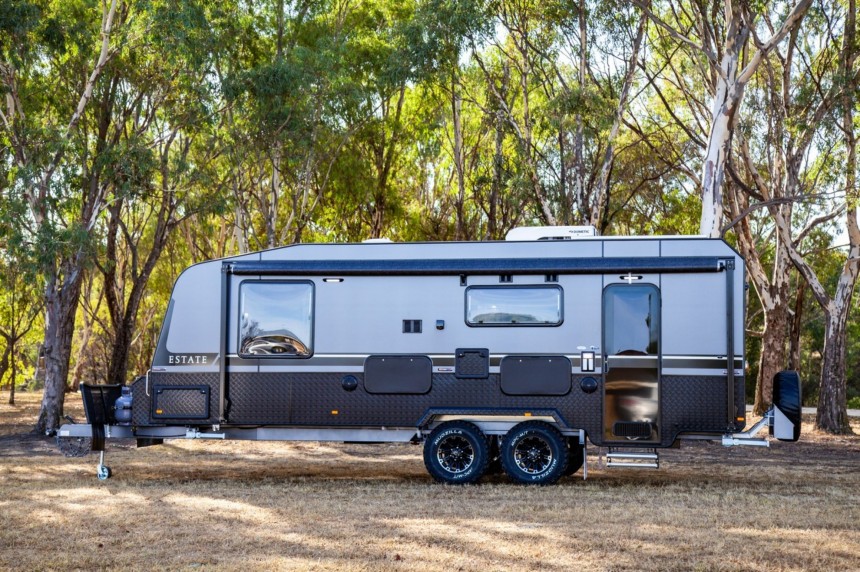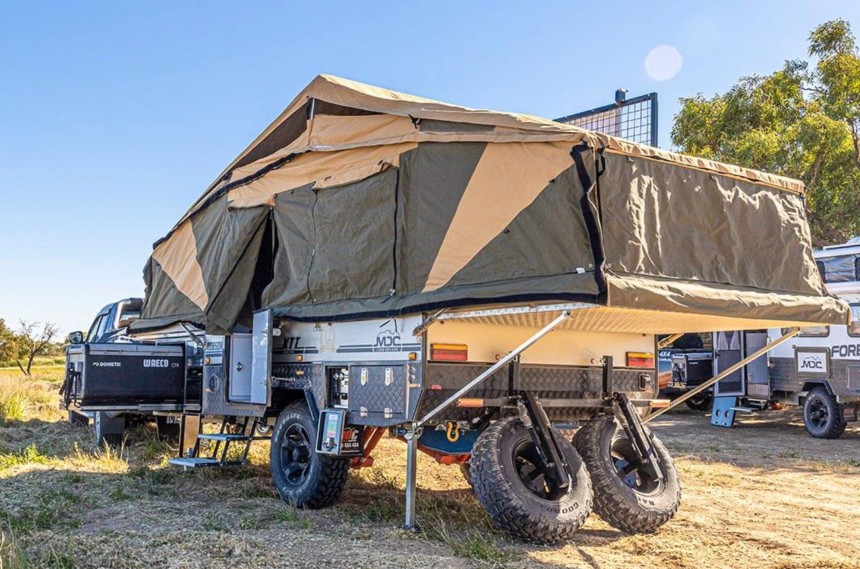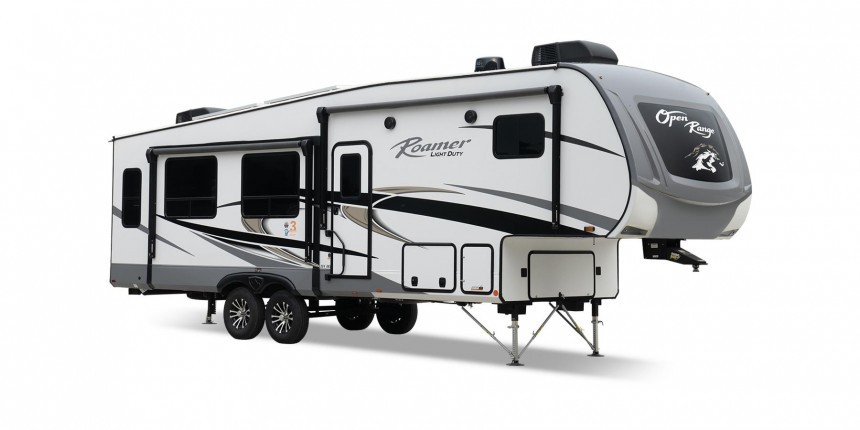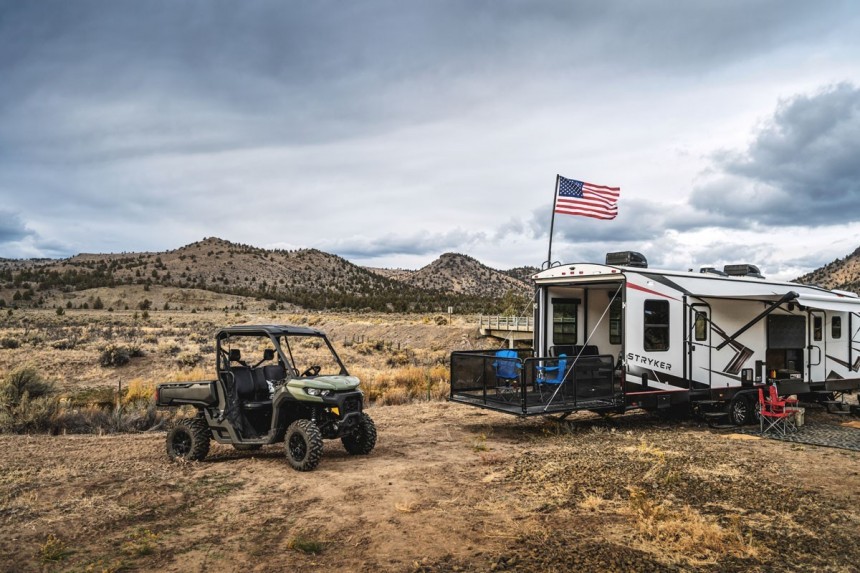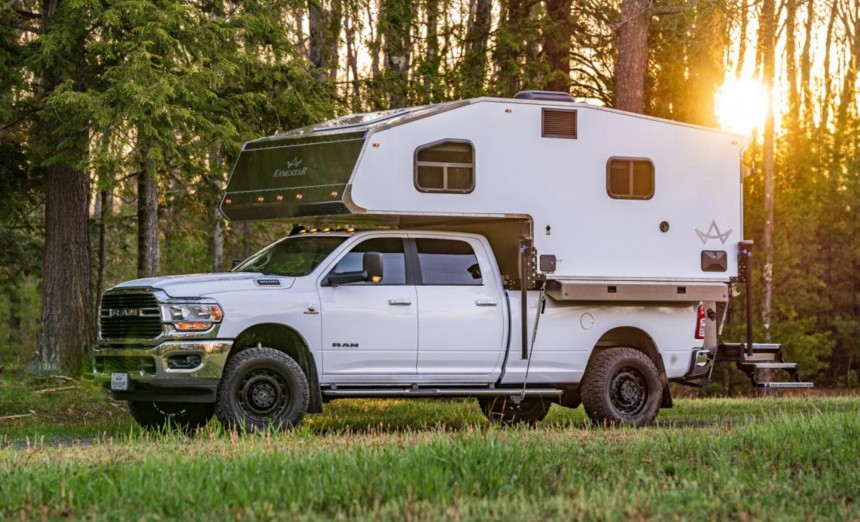If you're looking to get into a mobile home lifestyle, there's a wide variety of campers you can choose from. In one of my recent articles, I explained the three types of RV classes. Today, I'm taking a look at all towable campers, how they're different from one another, and how to tell if they're the right tiny home for you.
What makes trailers different from motorhomes is that they must be towed behind other vehicles. The type and weight of the trailer will determine what type of vehicle you need to pull it. Here are the main five types of trailers: Travel trailers, Pop-up trailers, Fifth Wheels, Toy Haulers, and Truck campers.
Before we go into detail, let me compare motorized RVs and trailers. Each camper has its own set of benefits – here are the biggest differences to consider.
First off, let's talk about budget, as it's typically one of the most important buying factors. Trailers usually have much lower prices than motorized RVs, but that's because you need a vehicle to tow a trailer. Of course, if you already have a pickup truck or any other vehicle capable of towing, it makes sense to consider a trailer. But if you don't, make sure to factor in the price of a towing rig.
Next, we have mileage, which is also related to how much money you'll have to pour into your RV lifestyle. Generally speaking, motorhomes will get less mileage/gallon compared to their trailer counterparts. On the other hand, towing a trailer will have a significant impact on the mileage of the vehicle you're using for towing.
Motorhomes or RVs are typically more expensive to insure than trailers. Another thing to consider is depreciation – like all vehicles, both trailers and RVs will depreciate over time. However, because RVs have mechanical components, they're susceptible to losing their value even more.
Just like mentioned in my previous article, although most RVs do not require a special driving license (only for those with a weight of over 26,000 pounds), they might take a while to get used to when it comes to drivability. When towing a trailer behind a vehicle, there's not that much of a difference.
One question you must ask yourself before purchasing any type of tiny home on wheels is, "How long and often will I use it?" If you plan on moving full-time on the road or traveling for weeks and months consecutively, an RV might prove to be a more comfortable solution. If you plan to travel a few times a year for vacation, a travel trailer could be a better choice.
And lastly, we have space – generally, RVs boast much more space than similarly sized trailers. So, if you need more living space and more storage space, an RV might be better than a trailer. Of course, it depends on your exact needs – as you'll soon see, there are many types of trailers. With proper research, it's close to impossible not to find a mobile home that's right for you.
Travel trailers are by far the most common type of non-motorized RV. They come in many shapes and sizes and are also known as "bumper pull trailers" because when they first became popular in the early 1950s, they were attached to the bumper of the tow vehicle. Nowadays, they use a hitch secured to the frame of your tow vehicle.
These trailers tip the scales between 2,200 and 14,000 pounds and are usually between 10 and 42 feet long. Moreover, they can come with slideouts and can accommodate a large number of people, with some sleeping 10 people, or even more.
Given it's such a popular type of trailer, specs vary significantly from one model to another. Regarding features, most will come with a bedroom, a bathroom, a kitchen, an entertainment center, and plenty of storage spaces both inside and outside the rig.
Most travel trailers will connect to a standard trailer hitch. Moreover, the smallest travel trailer can be pulled by a small SUV, but the bigger you go, the larger your towing vehicle will need to be. If you're looking for something smaller, check out my list of the best micro campers of 2023.
There are additional types of trailers that fall under the travel trailer umbrella. For instance, we have the teardrop trailers – they're smaller in size and feature a distinctive teardrop shape. Moreover, because of their compact size, some of them can go pretty much anywhere, and there are many models that are designed with off-roading and overlanding in mind.
Bigger is now always better, as demonstrated by hybrid travel trailers – they are a blend between traditional travel trailers and pop-up trailers (which I'll talk about next). Basically, they combine the solid construction of a travel trailer with the compactness and lightweightness of pop-up campers. Moreover, they're small in size and feature a hard-sided body with expandable sections. When fully set up, the space they offer rivals that of a larger travel trailer, yet their weight remains lower.
One of the pros of travel trailers is that you'll find a wide variety of sizes and price ranges due to their popularity. What's more, there are numerous models that can be towed with an SUV if you're not planning on buying a pickup truck.
Pop-up campers, also known as tent trailers, are towable trailers that can be expanded by unfolding their sides, which are usually made of canvas. What's more, they're more similar to a camping tent rather than to other RVs or trailers. They usually measure from 8 to 16 feet and tip the scales between 700 and 4,000 pounds.
What makes them an excellent option is their lightweightness, which also makes them easy to tow. Furthermore, compared to other types of trailers and RVs, they are budget-friendly. On the other hand, they lack some of the amenities found in larger trailers.
There are two subtypes of pop-up trailers: soft-sided and hard-sided. Soft-sided ones have canvas sides and, thus, better airflow, making them suitable for those looking to enjoy the open-air feeling. Hard-sided ones have stiffer pop-up sections that provide better insulation.
Regarding features, you can expect to find a bedroom, a dining area, and a decently equipped kitchen with a fridge, a sink, and a stovetop, although higher-end models come with more than that. Generally, they don't have any bathroom facilities.
All in all, pop-up trailers are affordable, lightweight, and compact, making them easy to store in residential garages. It's perfect for tent campers who want to transition to an RV but aren't fully ready to commit. At the same time, pop-up trailers are subject to noise and extreme temperatures. Moreover, they have limited storage space.
You'll have to empty out at least $10,000 for a new pop-up trailer. Moreover, prices can go up to $40,000 or more for hard-sided and A-frame style pop-up trailers. People usually go for relatively basic units to get a taste of the camping lifestyle – they're a great beginner-friendly option, as you don't have to spend all of your savings on one.
A fifth wheel is the largest trailer you can buy. The reason it's called a "fifth wheel" is because the front of the trailer extends over the bed of the truck. That's also where you'll find the hitching mechanism, a U-shaped coupling component. This part makes it easier for fifth wheels to be towed than other types of trailers, allowing the trailer to turn easily because it's closer to the towing vehicle.
If we were to compare fifth wheels and RV classes, fifth wheels are definitely closest to Class A RVs. They often measure between 22 and 40 feet front to back and are around 10 feet tall. Given their sheer size and weight (usually between 7,000 and 20,000 pounds), you need a pickup truck with a specially fitted hitch. Turbo-diesel trucks and trucks with longer beds are more suitable. Furthermore, you must ensure the towing vehicle's tires and suspension can support the weight.
A fifth wheel is usually fitted with multiple slideouts, which create a large amount of space inside. They can comfortably accommodate four to eight people, although more than that could fit. Moreover, the interior space will feel much roomier due to the ceiling height.
Regarding amenities, the wheels tend to be the best equipped out of all the trailer types. Expect to discover bathrooms and bedrooms – yes, I mean multiple ones in a single trailer. Of course, that also means a much higher price.
Add to that a suitable truck and hitch equipment, and you'll have to empty out even more money out of your bank account. The smallest 5th wheel will cost at least $18,000, while high-end, fully-equipped models can have a price tag of over $200,000.
Another significant advantage of a fifth wheel trailer is the increased stability when towing. Moreover, fifth wheels are offered in a wide variety of lengths and layouts.
At the same time, their size might mean you can't enter certain campsites or store them in residential garages due to their increased height.
If you're into grown-up toys like motorbikes, UTVs, and other vehicles and would like to bring them on your camping adventures, then a toy hauler is a suitable choice. Small travel trailer toy haulers will provide enough space to store a motorbike or a tiny watercraft, but you can go way bigger than that with an enormous fifth wheel with enough room to store one or more off-road machines.
Typically, toy haulers feature less flashy decor, with more of a focus on practicality. Oftentimes, especially in smaller toy haulers, the garage area extends into the living area. While that offers additional space, it also means that you'll feel all the smells coming from the vehicle.
Another critical factor to consider when dealing with toy haulers is weight – it's very likely you'll require a heavy-duty truck to tow a toy hauler. For instance, a ½ ton pickup won't be able to support the payload.
In most cases, toy haulers will have a ramp at the rear of the trailer that folds down. Moreover, the garage's floor is typically reinforced to support the vehicle's weight.
The smallest toy hauler will cost around $18,000, but you can find many larger and better-equipped ones for up to $200,000 – you can surely expect luxury features in those.
While truck campers aren't trailers in the usual sense, I think they have a spot on this list due to the fact they're used for camping and need to be connected to another vehicle. They're also known as slide-in campers and pickup campers.
If you don't want to tow a trailer or drive a large motorhome and don't require lots of living space, a truck camper might be the best choice for you. Furthermore, there are pop-up variants available that work in the same way as a pop-up trailer does.
You can expect a truck camper to be between 6 and 20 feet long, with a sleeping capacity of up to four people. It tips the scales between 700 and 4,200 pounds.
Truck campers typically feature a sleeping area, a seating area, a bathroom, and a kitchen. They're the least equipped from this list of trailers. RV truck campers will come with a loft area and a similar construction to RVs, so you can expect fiberglass walls.
Of course, the size and layout of the camper pod depend on the truck you're using. For instance, if you're using a mid-size truck, the campers have just basic amenities to keep the load weight down. On the other hand, a heavy pickup truck with a long bed can fit 12-foot-long truck campers that are equipped with all the bells and whistles.
If you're looking to go off the beaten path, you can find a truck camper that's built to withstand the shocks of off-roading. The retail price of new slide-in campers can vary from $10,000 for the basic ones to $70,000 for a fully-equipped one.
The pros of slide-in campers are that they offer the RV experience in a compact package. Moreover, you'll find models for most types of trucks. On the other hand, they can make your truck more top-heavy, don't have a lot of storage spaces, and the interior might feel a bit cramped, especially if multiple people travel together.
Before we go into detail, let me compare motorized RVs and trailers. Each camper has its own set of benefits – here are the biggest differences to consider.
First off, let's talk about budget, as it's typically one of the most important buying factors. Trailers usually have much lower prices than motorized RVs, but that's because you need a vehicle to tow a trailer. Of course, if you already have a pickup truck or any other vehicle capable of towing, it makes sense to consider a trailer. But if you don't, make sure to factor in the price of a towing rig.
Next, we have mileage, which is also related to how much money you'll have to pour into your RV lifestyle. Generally speaking, motorhomes will get less mileage/gallon compared to their trailer counterparts. On the other hand, towing a trailer will have a significant impact on the mileage of the vehicle you're using for towing.
Motorhomes or RVs are typically more expensive to insure than trailers. Another thing to consider is depreciation – like all vehicles, both trailers and RVs will depreciate over time. However, because RVs have mechanical components, they're susceptible to losing their value even more.
Just like mentioned in my previous article, although most RVs do not require a special driving license (only for those with a weight of over 26,000 pounds), they might take a while to get used to when it comes to drivability. When towing a trailer behind a vehicle, there's not that much of a difference.
One question you must ask yourself before purchasing any type of tiny home on wheels is, "How long and often will I use it?" If you plan on moving full-time on the road or traveling for weeks and months consecutively, an RV might prove to be a more comfortable solution. If you plan to travel a few times a year for vacation, a travel trailer could be a better choice.
And lastly, we have space – generally, RVs boast much more space than similarly sized trailers. So, if you need more living space and more storage space, an RV might be better than a trailer. Of course, it depends on your exact needs – as you'll soon see, there are many types of trailers. With proper research, it's close to impossible not to find a mobile home that's right for you.
Travel Trailers
These trailers tip the scales between 2,200 and 14,000 pounds and are usually between 10 and 42 feet long. Moreover, they can come with slideouts and can accommodate a large number of people, with some sleeping 10 people, or even more.
Given it's such a popular type of trailer, specs vary significantly from one model to another. Regarding features, most will come with a bedroom, a bathroom, a kitchen, an entertainment center, and plenty of storage spaces both inside and outside the rig.
Most travel trailers will connect to a standard trailer hitch. Moreover, the smallest travel trailer can be pulled by a small SUV, but the bigger you go, the larger your towing vehicle will need to be. If you're looking for something smaller, check out my list of the best micro campers of 2023.
There are additional types of trailers that fall under the travel trailer umbrella. For instance, we have the teardrop trailers – they're smaller in size and feature a distinctive teardrop shape. Moreover, because of their compact size, some of them can go pretty much anywhere, and there are many models that are designed with off-roading and overlanding in mind.
Bigger is now always better, as demonstrated by hybrid travel trailers – they are a blend between traditional travel trailers and pop-up trailers (which I'll talk about next). Basically, they combine the solid construction of a travel trailer with the compactness and lightweightness of pop-up campers. Moreover, they're small in size and feature a hard-sided body with expandable sections. When fully set up, the space they offer rivals that of a larger travel trailer, yet their weight remains lower.
One of the pros of travel trailers is that you'll find a wide variety of sizes and price ranges due to their popularity. What's more, there are numerous models that can be towed with an SUV if you're not planning on buying a pickup truck.
Pop-up Trailers
What makes them an excellent option is their lightweightness, which also makes them easy to tow. Furthermore, compared to other types of trailers and RVs, they are budget-friendly. On the other hand, they lack some of the amenities found in larger trailers.
There are two subtypes of pop-up trailers: soft-sided and hard-sided. Soft-sided ones have canvas sides and, thus, better airflow, making them suitable for those looking to enjoy the open-air feeling. Hard-sided ones have stiffer pop-up sections that provide better insulation.
Regarding features, you can expect to find a bedroom, a dining area, and a decently equipped kitchen with a fridge, a sink, and a stovetop, although higher-end models come with more than that. Generally, they don't have any bathroom facilities.
All in all, pop-up trailers are affordable, lightweight, and compact, making them easy to store in residential garages. It's perfect for tent campers who want to transition to an RV but aren't fully ready to commit. At the same time, pop-up trailers are subject to noise and extreme temperatures. Moreover, they have limited storage space.
You'll have to empty out at least $10,000 for a new pop-up trailer. Moreover, prices can go up to $40,000 or more for hard-sided and A-frame style pop-up trailers. People usually go for relatively basic units to get a taste of the camping lifestyle – they're a great beginner-friendly option, as you don't have to spend all of your savings on one.
Fifth Wheels
If we were to compare fifth wheels and RV classes, fifth wheels are definitely closest to Class A RVs. They often measure between 22 and 40 feet front to back and are around 10 feet tall. Given their sheer size and weight (usually between 7,000 and 20,000 pounds), you need a pickup truck with a specially fitted hitch. Turbo-diesel trucks and trucks with longer beds are more suitable. Furthermore, you must ensure the towing vehicle's tires and suspension can support the weight.
A fifth wheel is usually fitted with multiple slideouts, which create a large amount of space inside. They can comfortably accommodate four to eight people, although more than that could fit. Moreover, the interior space will feel much roomier due to the ceiling height.
Regarding amenities, the wheels tend to be the best equipped out of all the trailer types. Expect to discover bathrooms and bedrooms – yes, I mean multiple ones in a single trailer. Of course, that also means a much higher price.
Add to that a suitable truck and hitch equipment, and you'll have to empty out even more money out of your bank account. The smallest 5th wheel will cost at least $18,000, while high-end, fully-equipped models can have a price tag of over $200,000.
Another significant advantage of a fifth wheel trailer is the increased stability when towing. Moreover, fifth wheels are offered in a wide variety of lengths and layouts.
At the same time, their size might mean you can't enter certain campsites or store them in residential garages due to their increased height.
Toy Haulers
Typically, toy haulers feature less flashy decor, with more of a focus on practicality. Oftentimes, especially in smaller toy haulers, the garage area extends into the living area. While that offers additional space, it also means that you'll feel all the smells coming from the vehicle.
Another critical factor to consider when dealing with toy haulers is weight – it's very likely you'll require a heavy-duty truck to tow a toy hauler. For instance, a ½ ton pickup won't be able to support the payload.
In most cases, toy haulers will have a ramp at the rear of the trailer that folds down. Moreover, the garage's floor is typically reinforced to support the vehicle's weight.
The smallest toy hauler will cost around $18,000, but you can find many larger and better-equipped ones for up to $200,000 – you can surely expect luxury features in those.
Truck Campers
If you don't want to tow a trailer or drive a large motorhome and don't require lots of living space, a truck camper might be the best choice for you. Furthermore, there are pop-up variants available that work in the same way as a pop-up trailer does.
You can expect a truck camper to be between 6 and 20 feet long, with a sleeping capacity of up to four people. It tips the scales between 700 and 4,200 pounds.
Truck campers typically feature a sleeping area, a seating area, a bathroom, and a kitchen. They're the least equipped from this list of trailers. RV truck campers will come with a loft area and a similar construction to RVs, so you can expect fiberglass walls.
Of course, the size and layout of the camper pod depend on the truck you're using. For instance, if you're using a mid-size truck, the campers have just basic amenities to keep the load weight down. On the other hand, a heavy pickup truck with a long bed can fit 12-foot-long truck campers that are equipped with all the bells and whistles.
If you're looking to go off the beaten path, you can find a truck camper that's built to withstand the shocks of off-roading. The retail price of new slide-in campers can vary from $10,000 for the basic ones to $70,000 for a fully-equipped one.
The pros of slide-in campers are that they offer the RV experience in a compact package. Moreover, you'll find models for most types of trucks. On the other hand, they can make your truck more top-heavy, don't have a lot of storage spaces, and the interior might feel a bit cramped, especially if multiple people travel together.
